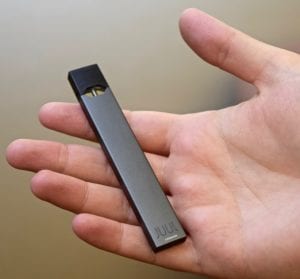Who is a member?
Our members are the local governments of Massachusetts and their elected and appointed leadership.

A Juul brand e-cigarette
In the past few months, the U.S. Food and Drug Administration, the U.S. surgeon general and the U.S. Centers for Disease Control have all issued statements about the urgent need to address the epidemic of youth use of e-cigarettes and other vaping products.
The FDA reports that 3.6 million middle and high school students nationwide used vaping products in 2018, up 70 percent over 2017.
Public schools are forced to deal with the spike in vaping product use, prompting cities and towns to focus on tougher retail sales policies and revamped school policies.
In December, the Somerville Board of Health amended the city’s tobacco sales health regulation, effective April 1, in order to limit the sale of e-cigarettes and vaping products to adult-only “retail tobacco stores” (tobacconists and vape shops). The intent is to reduce availability to youths, while allowing adults to obtain these products only in qualifying specialty stores that will be monitored closely.
Three Somerville retailers are seeking a temporary restraining order and preliminary injunction, alleging that the policy exceeds the Board of Health’s authority and is arbitrary and capricious. State law permits local boards of health to enact “reasonable” health regulations.
The town of Dover, meanwhile, has enacted a health regulation that bans the sale of e-cigarettes and vaping products, as well as flavored tobacco products (including mint, menthol and wintergreen). Dover did not create a retail tobacco store exemption.
The Somerville Board of Health also strengthened its flavored tobacco product sales restrictions to include menthol, mint and wintergreen as flavors. Needham and Ashland enacted similar amendments.
Menthol in tobacco and vaping products produces a cooling effect for the user while reducing the harshness of the smoke or vapor. About one-third of American smokers use menthol cigarettes, and menthol and mint versions of e-cigarettes are also popular.
The first sales restriction on flavored tobacco products was enacted as an ordinance by the city of Providence, R.I., in 2012. The ordinance expanded on a 2009 federal law that prohibited the sale of flavored cigarettes (exempting mint, menthol and wintergreen) to include e-cigarettes.
Providence’s ordinance was upheld by the federal Court of Appeals in 2013. Because Massachusetts is in the same federal court district, 142 cities and towns in Massachusetts have copied the Providence language.
School districts may amend policies to include e-cigarette use and/or vaping in the section that deals with tobacco use. In addition, the state’s smoke-free workplace law (Ch. 270, Sec. 22) permits “a municipal government or its agent” to issue a civil (non-criminal disposition) $100 fine to anyone smoking or vaping in a prohibited location, including schools. The law allows municipalities to use their established deputizing procedures to authorize school personnel to enforce this particular section.
D.J. Wilson is available at the MMA to help local officials interested in strengthening policies on tobacco and vaping product sales.